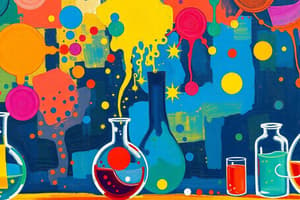Podcast
Questions and Answers
What is the primary focus of organic chemistry?
What is the primary focus of organic chemistry?
- Study of carbon-containing compounds (correct)
- Analysis of gases and their properties
- Study of inorganic compounds
- Study of chemical processes in living organisms
Which branch of chemistry primarily involves the analysis of substances?
Which branch of chemistry primarily involves the analysis of substances?
- Biochemistry
- Physical Chemistry
- Analytical Chemistry (correct)
- Inorganic Chemistry
Which of the following statements describes the law of conservation of mass?
Which of the following statements describes the law of conservation of mass?
- Mass increases during physical changes.
- Mass can be created or destroyed in reactions.
- Mass is lost during chemical transformations.
- Mass is neither created nor destroyed in a chemical reaction. (correct)
What type of bond is formed by the sharing of electrons between atoms?
What type of bond is formed by the sharing of electrons between atoms?
Which property is characteristic of gases according to Avogadro's Law?
Which property is characteristic of gases according to Avogadro's Law?
Which laboratory technique is used to separate mixtures based on the differential affinities of compounds?
Which laboratory technique is used to separate mixtures based on the differential affinities of compounds?
What happens to a system at equilibrium when there is a change, according to Le Chatelier's Principle?
What happens to a system at equilibrium when there is a change, according to Le Chatelier's Principle?
Which state of matter consists of tightly packed particles that have a fixed shape and volume?
Which state of matter consists of tightly packed particles that have a fixed shape and volume?
Flashcards are hidden until you start studying
Study Notes
Overview of Chemistry
- Definition: Chemistry is the scientific study of matter, its properties, composition, structure, and the changes it undergoes during chemical reactions.
Branches of Chemistry
-
Organic Chemistry
- Study of carbon-containing compounds.
- Focus on hydrocarbons and their derivatives.
-
Inorganic Chemistry
- Study of inorganic compounds, typically those that do not contain carbon-hydrogen bonds.
- Includes metals, minerals, and organometallic compounds.
-
Physical Chemistry
- Combines principles of physics and chemistry.
- Examines how matter behaves on a molecular and atomic level.
-
Analytical Chemistry
- Focuses on the qualitative and quantitative analysis of substances.
- Techniques include chromatography, spectroscopy, and titration.
-
Biochemistry
- Study of chemical processes within and related to living organisms.
- Involves macromolecules like proteins, lipids, carbohydrates, and nucleic acids.
Key Concepts
-
Atoms and Molecules
- Atoms: Basic units of matter composed of protons, neutrons, and electrons.
- Molecules: Groups of two or more atoms bonded together.
-
Chemical Reactions
- Process where reactants transform into products.
- Types include synthesis, decomposition, single replacement, and double replacement reactions.
-
States of Matter
- Solid, liquid, gas, and plasma.
- Changes in state involve energy exchange.
-
Periodic Table
- Organized arrangement of elements based on atomic number.
- Groups indicate elements with similar properties, while periods show energy levels.
-
Chemical Bonding
- Ionic Bonds: Transfer of electrons between atoms.
- Covalent Bonds: Sharing of electrons between atoms.
- Metallic Bonds: Attraction between metal atoms and delocalized electrons.
Important Laws and Theories
-
Law of Conservation of Mass
- Mass is neither created nor destroyed in a chemical reaction.
-
Avogadro's Law
- Equal volumes of gases, at the same temperature and pressure, contain an equal number of molecules.
-
Le Chatelier's Principle
- A system at equilibrium will adjust to counteract changes, restoring a new equilibrium.
Laboratory Techniques
-
Titration
- Method for determining the concentration of a solute in a solution.
-
Chromatography
- Technique for separating mixtures based on differential affinities of compounds.
-
Spectroscopy
- Analyzing the interaction of light with matter to determine composition.
Safety and Ethics
- Always follow safety protocols in the lab.
- Understand the ethical implications of chemical research and applications, especially in pharmaceuticals and environmental chemistry.
Overview of Chemistry
- Chemistry studies matter in terms of its properties, composition, structure, and the changes it undergoes during chemical reactions.
Branches of Chemistry
-
Organic Chemistry:
- Involves the study of carbon-containing compounds, focusing primarily on hydrocarbons and their derivatives.
-
Inorganic Chemistry:
- Addresses inorganic compounds, excluding those with carbon-hydrogen bonds, covering metals, minerals, and organometallic substances.
-
Physical Chemistry:
- Merges physics and chemistry, exploring the behavior of matter at molecular and atomic levels.
-
Analytical Chemistry:
- Concentrates on qualitative and quantitative analysis techniques such as chromatography, spectroscopy, and titration.
-
Biochemistry:
- Examines chemical processes in living organisms, focusing on macromolecules such as proteins, lipids, carbohydrates, and nucleic acids.
Key Concepts
-
Atoms and Molecules:
- Atoms are the foundational units of matter made up of protons, neutrons, and electrons; molecules consist of two or more bound atoms.
-
Chemical Reactions:
- Involves transformation from reactants to products, including synthesis, decomposition, single replacement, and double replacement reactions.
-
States of Matter:
- Matter exists in solid, liquid, gas, and plasma states, with state changes accompanied by energy exchange.
-
Periodic Table:
- Elements are organized by atomic number, with groups reflecting similar properties and periods indicating energy levels.
-
Chemical Bonding:
- Includes ionic bonds (electron transfer), covalent bonds (electron sharing), and metallic bonds (attraction between metal atoms and delocalized electrons).
Important Laws and Theories
-
Law of Conservation of Mass:
- Asserts that mass cannot be created or destroyed in chemical reactions.
-
Avogadro's Law:
- States equal volumes of gases at the same temperature and pressure contain the same number of molecules.
-
Le Chatelier's Principle:
- Indicates that a system at equilibrium will adjust to counteract changes, establishing a new equilibrium.
Laboratory Techniques
-
Titration:
- A technique used to ascertain the concentration of a solute in a solution.
-
Chromatography:
- Separates mixtures based on the differing affinities of compounds.
-
Spectroscopy:
- Analyzes light interactions with matter to deduce composition.
Safety and Ethics
- Adhere strictly to safety protocols in the laboratory.
- Recognize the ethical considerations surrounding chemical research and its applications in sectors like pharmaceuticals and environmental science.
Studying That Suits You
Use AI to generate personalized quizzes and flashcards to suit your learning preferences.




